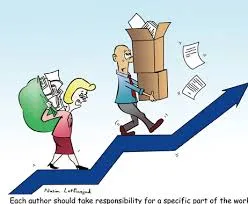As a nascent academic scientist, one recurring problem I've noticed is authorship.
Publications are the currency of academic science. Without authoring publications, one cannot graduate from their Ph.D. program, obtain their next job, or get grant funding. Although we place such great importance on our publication records, the rules that govern authorship decisions, such as author order and the threshold for inclusion as an author, are nearly non-existent. For example, someone who did several experiments and hours of data analysis for a project might not be included as author, whereas someone who merely discussed a project once for 10 minutes at a conference could be included as an author.

source
In this post, I'll discuss my ideas about the way authorship works now, and how I think it should be.
Before diving into this complex topic, lets discuss the status quo.
What does it mean to be the first author? the last author? a middle author?
What contribution(s) warrant inclusion as an author?
The only points of consensus, generally:
The author listed first is the person who 'owns' the project.
Some people think that the first author did the most work. While this is true in many cases, as scientific studies become more interdisciplinary and complex, drawing on the contributions of many people, the role of the first author has become muddied. First authors may have only served as a sub-manager of the project, acting in a role similar to the principal investigator (PI), but more managing the day-to-day project activities according to the structure agreed upon with the last author.
The author listed last is the group leader.
While this is often true, politically motivated decisions, such as an upcoming faculty application, or an impending retirement from the true leader, can easily cause 'guest' senior authorship to occur. In this case, although it might look like the last author was leading the project described in a manuscript, they actually did next-to-nothing for the project. I've seen this happen several times.
The middle authors provided necessary input, without which, the manuscript could not exist
Again, I've seen people added in a middle author position for doing literally nothing, and I've seen people who actually spent many hours on a project excluded.
What authorship means to the International Committee of Medical Journal Editors (ICMJE):
The ICMJE sets a high bar for academic authorship:
- Substantial contributions to the conception or design of the work; or the acquisition, analysis, or interpretation of data for the work; AND
- Drafting the work or revising it critically for important intellectual content; AND
- Final approval of the version to be published; AND
- Agreement to be accountable for all aspects of the work in ensuring that questions related to the accuracy or integrity of any part of the work are appropriately investigated and resolved.
Note the AND between each statement. You must do all of these to be included as an author according to ICMJE.
I've rarely seen anyone other than the first and last author meet all these criteria.
What authorship means to me.
Personally, I draw the line at significant intellectual contribution to a manuscript or conference abstract. You must have actually used your body of knowledge to positively influence a project. Performing the protocol steps to generate some data is not enough in my opinion. Someone who did early experiments related to a project, but had no involvement in the actual work presented within the manuscript or abstract is not an author. In no senario should someone receive authorship for a entirely complete manuscript that they have never seen before. This rule helps keep me sane while dealing with the apparently irrational authorship decisions occurring all around me everyday. Although I've argued for some level of consistency and logic in the past, I've never been able to keep the list authors accountable to these principles.
Authorship order:
The first author should have done the greatest portion of work, and be the primary person who actually drafted the manuscript. If a project has many aspects, and someone publishes a subset of that project, the person who did most of that subset should be the first author, not the person who 'owns' the project.
But the cheaters win:
Sadly, by trying to be ethical and uphold high authorship standards, we cannot compete with those who get added to papers willy-nilly for doing nothing. The people who are listed win, no matter if they did anything or not.
We need a better system for rewarding actual contributions, and we need incentives to promote ethical authorship practices.
Until we have this, the entire community will suffer, as inadequate scientists continue up the leadership ladder and taint all the work below their purview.
I don't have the answer yet, but I'm working on it, and I would love your input about how we can make the academic science community better through fair and transparent authorship.
Please share your opinions and experiences, as we need a healthy dialog before anything will change.